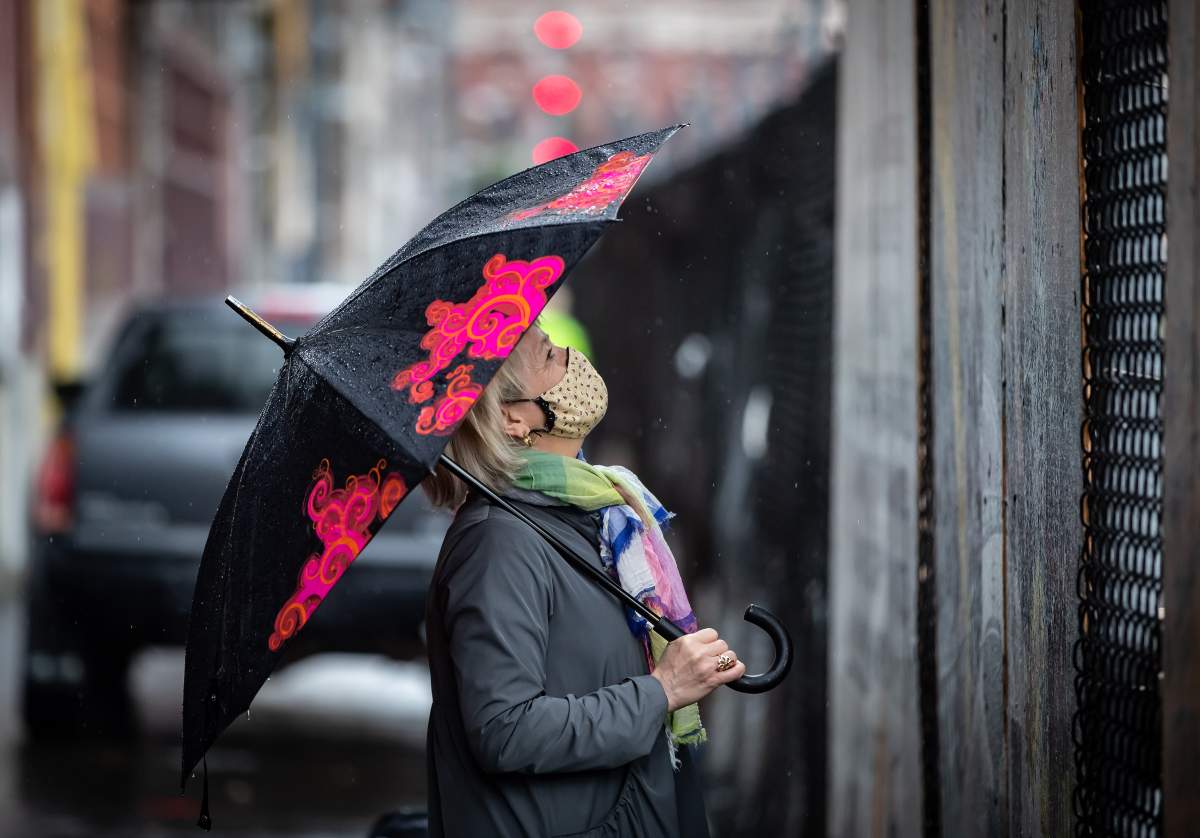British Columbia has been one of Canada’s most successful jurisdictions when it comes to bending down the curve of COVID-19 transmission.

Much of the credit goes to Dr. Bonnie Henry.
The province’s chief medical health officer has become a beloved figure, celebrated on T-shirts, on coffee mugs and in street murals. Her name and image have been emblazoned on designer shoes and made-in-B.C. specialty wines and craft beers.
The secret of her success? Maybe it’s the “soft power” she wields in such a calming and reassuring manner.
READ MORE: B.C. urges feds to tighten up coronavirus measures for airlines
Unlike other jurisdictions, British Columbia never imposed severe economic lockdowns in its fight against COVID-19. Instead, businesses and public services that did shut down did so on a largely voluntary basis.
Henry has also been reluctant to drop the hammer on those who do break rules and guidelines.
When young Vancouver residents recently gathered on a local beach for a giant “drum circle” (quickly derided as a “dumb circle” by critics) Henry was asked if they should have been rousted by airhorn-wielding cops.
“That’s not my style,” she replied, true to her personal pandemic motto (“Be kind, be calm, be safe”) that’s become familiar to British Columbians.


Get weekly health news
It’s an approach she reinforced recently when drivers of cars with out-of-province licence plates started to experience harassment.
Any vehicle displaying foreign plates — especially American ones — are also likely to display a home-made sign urging people not to insult them or damage their vehicles.
Cars with Washington state plates routinely display signs like “Here legally” or “I live in Vancouver, please do not harass, attack or damage.”
READ MORE: Feds crack down on Americans using ‘Alaska loophole’ to enter Canada
When B.C. Premier John Horgan was asked about the harassment, he had blunt advice for targeted motorists.
“I would suggest public transit,” he said. “I would suggest that they ride a bike.”
But, true to form, Henry declined to endorse the premier’s advice.
“We do not know everybody’s story,” Henry said, pointing out there are multiple reasons why someone could be legally driving a car with American licence plates in Canada despite border restrictions.
“We all are in this together, whether our licence plate is from somewhere else, whether it’s from Alberta or whether it’s from California,” she said.
Killing COVID with kindness has been a successful Bonnie Henry strategy.

Now B.C.’s top doc is under pressure to get tougher as the virus stages a worrisome rebound in the province.
Last week, Henry unveiled a controversial back-to-school plan that included student “cohorts” of up to 120 kids and staff in B.C. high schools, where students are set to return to full-time classes next month.
Compare that to Ontario, where high-school kids will attend class on alternate days to encourage social distancing.
The B.C. plan also does not include a mandatory face-mask requirement, like back-to-school plans in Ontario and Alberta.
Now Henry is under pressure to change the B.C. school plan and bring in stronger safety measures.
- More B.C. restaurants say money gone from 3rd-party program and still no answers
- Father of Tumbler Ridge school shooter issues statement: ‘I carry a sorrow’
- ‘We now have to figure out how to live life without her’: Mother of Tumbler Ridge shooting victim speaks
- Tumbler Ridge students who survived shooting spree describe terrifying lockdown
The powerful and militant B.C. teachers’ union is balking at the plan, and a keep-kids-home petition started by concerned parents is gaining steam online.
READ MORE: Online petition calls to keep attendance at B.C. schools voluntary come September
The backlash could force Henry to get tougher than she would like, perhaps with a mandatory-mask order.
There is pressure to force the use of face masks on public transit and in B.C. hospitals, too.
As the virus stages a summer comeback, British Columbia’s kinder-and-gentler approach to fighting COVID-19 will be put to the test.
If the B.C. caseload stays modest and manageable, the softer touch will be proven right again. If cases surge, a tougher response may come in the fall.
Mike Smyth is host of ‘The Mike Smyth Show’ on Global News Radio 980 CKNW in Vancouver and a commentator for Global News. You can reach him at mike@cknw.com and follow him on Twitter at @MikeSmythNews.













Comments
Want to discuss? Please read our Commenting Policy first.